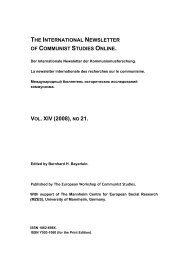11RXNdQ
11RXNdQ
11RXNdQ
You also want an ePaper? Increase the reach of your titles
YUMPU automatically turns print PDFs into web optimized ePapers that Google loves.
Colonialism and Neocolonialism 94<br />
his work enabled him to raise himself to the level of universality. He had known the bush,<br />
small towns, provincial cities and the capital; from the age of 18, he had escaped<br />
provincialism. His reading and Christian education had given him an image of man which<br />
was still abstract, but free of racism. In his speeches, it is striking that he explained the<br />
situation of the Congo by constant references to the French Revolution and the struggle<br />
of the Netherlands against the Spanish. And there is, of course, something of an ad<br />
hominem argument in these allusions: how could you whites prevent the blacks from<br />
doing what you did? But, beyond these polemic intentions, he is guided by a humanism<br />
of principle which cannot avoid being the ideology of the évolués: and indeed, it was in<br />
the name of homo faber that the latter claimed equality between Belgians and Congolese<br />
in the labour market. This universal concept immediately placed Lumumba above ethnic<br />
groups and tribalism: it allowed this wanderer to benefit from his travels and to interpret<br />
local problems in the light of the universal. It was from this point of view that he was to<br />
understand – beyond the diversity of customs, rivalries and discords – the unity of needs,<br />
interests and sufferings. The Administration placed him above the ordinary level: without<br />
a doubt this isolated him, but it also allowed him to understand the condition of the<br />
Congolese in its totality. From then on, whatever his audience, he constantly affirmed the<br />
unity of his country: what divided people was the legacy of a pre-colonial past carefully<br />
preserved by the Administration; what united them, at that time negatively, was a sort of<br />
common adversity that went deeper than traditions and customs since it attacked their<br />
lives at the root through overwork and undernourishment; in short, it was Belgian<br />
colonization which created the Congolese nation by perpetual and omnipresent<br />
aggression.<br />
This is both true and false. Colonization unifies, but it divides at least as much, not<br />
only by design and Machiavellianism – that would be nothing – but through the division<br />
of labour that it introduces and the social classes that it creates and stratifies. In the<br />
towns, socio-professional bonds tended to win over tribal bonds, but, on closer<br />
examination, divisions based on work, standard of living and education were superadded<br />
to ethnic divisions inside black districts. To this had to be added the conflicts between the<br />
first and the last to be urbanized. The proletariat of the camps was not the same as that of<br />
the towns, and above all, the rural ‘coutumiers’, ruled by conservative tribalism more<br />
often than not sold out to the Europeans, did not enter into the field of view of évolué<br />
town-dwellers. But the nascent petty bourgeoisie could not avoid making the same<br />
mistake as the French bourgeoisie at the time of the Revolution: confronted with a<br />
disorganized proletariat with confused demands, and a peasantry from which it had<br />
emerged and whose aspirations it imagined it knew, it took itself to be the universal class.<br />
The only differentiation which it was willing to acknowledge had nothing to do with the<br />
economy: the évolués defined themselves, according to the wish of the colonial<br />
administration, by their degree of education. The culture they had received was their<br />
pride and their most vital substance. The best among them believed that this imposed<br />
upon them the strict duty of leading their illiterate brothers from the camps and the bush<br />
to autonomy or independence. I say that this illusion was inevitable: how could<br />
Lumumba, who went to ‘The Fathers’’ school in a loincloth and would maintain peasant<br />
ties until his death, really consider himself as the representative of a new class? If he<br />
lived better, it was simply due to his merit. The abject and very skilfully chosen word




